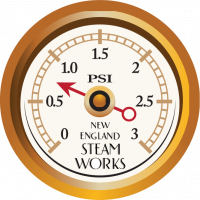Asthma Attacks from New Steam Boiler, please help...
Comments
-
FWIW I called Charlie a few years ago. I was very happy with the service he provided. Would recommend to others.Charlie from wmass said:413 841 6726 call me
0 -
Before removing all the tape I too was totally in doubt that it could have been that because i boiled some and microwaved it and burned it and yada yada....
only the burning of it made a similar smell. (and you have to remember that just a few molecules are enough to set off an asthmatic. )
AND YET, if you see the photos of the tape inside the pipe, SOMETHING made it melt to the pipe, fuse with the rust, and shrivel to a black char version of itself all INSIDE the pipe, not inside the threads. so to us, that was suspicious enough to warrant removal regardless of what science dictated should be happening.
and since i had only one shot at a willing plumber here on premises, we decided to just try to undo as much of what all new "stuff" was added by original installer.
whole system had been flushed previous, but not higher pressure water flushed like the final two times.
and someone asked what i meant by tank. i meant the boiler itself.
so does anyone know if NeilC identical problem a month ago has been resolved? I'm happy to talk to him with any help I can offer...
-casey 617 359-7941 leave a msg
1 -
i uploaded two other photos that are better but now i dont see them on the list... where'd they go???0
-
Let's find out. @neilc ??asthma said:Before removing all the tape I too was totally in doubt that it could have been that because i boiled some and microwaved it and burned it and yada yada....
only the burning of it made a similar smell. (and you have to remember that just a few molecules are enough to set off an asthmatic. )
AND YET, if you see the photos of the tape inside the pipe, SOMETHING made it melt to the pipe, fuse with the rust, and shrivel to a black char version of itself all INSIDE the pipe, not inside the threads. so to us, that was suspicious enough to warrant removal regardless of what science dictated should be happening.
and since i had only one shot at a willing plumber here on premises, we decided to just try to undo as much of what all new "stuff" was added by original installer.
whole system had been flushed previous, but not higher pressure water flushed like the final two times.
and someone asked what i meant by tank. i meant the boiler itself.
so does anyone know if NeilC identical problem a month ago has been resolved? I'm happy to talk to him with any help I can offer...
-casey 617 359-7941 leave a msg0 -
-
on top photo, the part hanging inside is black and shriveled and was so when found. it wasn't dislodged from threads.
in bottom photo, the tape itself had changed shape due to melting. visible on right hand blue edge. also note the rust track footprint where this bit had been fused to inside of pipe. if the tape points to 11 oclock, the footprint points to 8:30.
i used to be a forensic lab biologist. materials were under my microscope alot.0 -
i'm glad your problem is resolved0
-
For what it is worth, I use blue monster tape and megaloc dope on all my installations. I have never had the above listed problem. I think the tape is a red herring.Cost is what you spend , value is what you get.
cell # 413-841-6726
https://heatinghelp.com/find-a-contractor/detail/charles-garrity-plumbing-and-heating5 -
Casey,
Fred,
et al,
I am not, nor have not, been victim to this scenario.
I think I did mention another thread that was running concurrently when I read this one,
just trying to help find a common link.
Casey, good on you for finding and alleviating your issue,
and to everyone here trying to help out.known to beat dead horses0 -
-
@BobC Well over 400 degrees. And it doesn't react with many chemicals, one of the reasons it's in such widespread use in the pharmaceutical industry. But, like @Fred mentioned, this could have been a bad batch of tape that, under normal circumstances, no one would have noticed the off gassing that someone sensitive to it would. Not saying it's the tape, spent enough time investigating issues where I work to know we don't have enough info.You can have it good, fast or cheap. Pick two1
-
@asthma , it was @Justin who posted a similar situation. Here is his post:
http://forum.heatinghelp.com/discussion/159680/awful-smell-health-concerns-from-new-weil-mclain-install/p1
1 -
so...after all this..anyone want to go to CT to check it out? (take pics cause curiosity is killing me)0
-
For the last 9 months I have been running test parts in a steam system at 5PSIG for 12 hours at a time. They were machined from pure Teflon bar stock. Absolutely zero change in their performance or appearance. I would open them up and if there was a bad odor I probably would have noticed.
Not sure the tape is 100% Teflon like my bar stock, maybe there were other ingredients?
The important thing is that you are up an running and can breathe easy!Peter Owens
SteamIQ-1 -
-
I assumed that was just the rough machining of the fitting.JUGHNE said:What is the rust/debris in the tee in the last picture? Seems to have a lot of build up for what looks to be a new Tee.
Was that tee in the return?
Looks like a Chinese fitting, they're rarely nice and clean.
Single pipe 392sqft system with an EG-40 rated for 325sqft and it's silent and balanced at all times.
0 -
I actually used wicken with pipe dope for many years....never an issue....Also used blue monster and never an issue....I don't by it at all that ptfe was the cause.....On a slightly off note I recall a Story by Dan about a maintenance guy taking a wiz and putting it in the steam boiler just to piss off the people he was pissed at0
-
-
"i have plenty more pics if folks want to see more."
Hello, I would like to see more. Perhaps more photos will help to resolve the question of Teflon vaporizing at a relatively low temperature.
Yours, Larry0 -
Blue monster is the only blue tape I have seen. Has anyone seen other blue tape?Cost is what you spend , value is what you get.
cell # 413-841-6726
https://heatinghelp.com/find-a-contractor/detail/charles-garrity-plumbing-and-heating0 -
Categories
- All Categories
- 87.5K THE MAIN WALL
- 3.3K A-C, Heat Pumps & Refrigeration
- 61 Biomass
- 430 Carbon Monoxide Awareness
- 122 Chimneys & Flues
- 2.1K Domestic Hot Water
- 5.9K Gas Heating
- 118 Geothermal
- 170 Indoor-Air Quality
- 3.8K Oil Heating
- 78 Pipe Deterioration
- 1K Plumbing
- 6.6K Radiant Heating
- 395 Solar
- 15.9K Strictly Steam
- 3.5K Thermostats and Controls
- 57 Water Quality
- 51 Industry Classes
- 51 Job Opportunities
- 18 Recall Announcements














